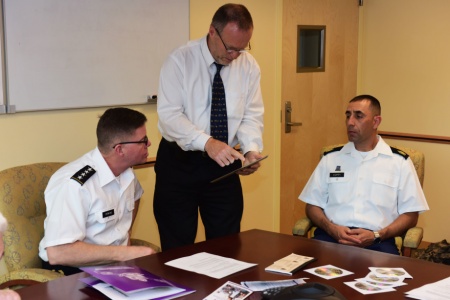TRADOC Commanding Generals Says DLIFLC is an Example for Army University, Discusses Importance of Culture Training
MONTEREY, Calif. – The Defense Language Institute Foreign Language Center welcomed Gen. David Perkins, the commanding general of the U.S. Army Training and Doctrine Command at Fort Eustis, Virginia, to the Presidio of Monterey, California, Feb. 9.
“Something we are trying to increase and propagate in the Army is that we want you to continue your education and your level of self-development,” said Perkins. “For the rest of your life we want you to build tools to stay connected to the community of learning, and I think DLIFLC is really setting a great example of how we do that.”
Dr. Branka Sarac, director of technology integration, and Dr. Tamas Marius, director of language technology evaluation and assessment, showed the general some of the language training products produced by DLIFLC that are available for pre-deployment training, deployment use or refresher training.
“Some of the technology that I just saw – the web access, voice recognition, self-paced distance learning – I think that is going to be key so that people other than just professionally trained linguists have at least a minimum background in language and culture,” said Perkins.
Through technology, Perkins would like to see language and culture training given to the total force as he spoke about the ever-changing role of training in the military. For 75 years, linguists have been trained at DLIFLC. Graduating with a high level of proficiency, they go on to become the language experts at the units to which they are assigned, but as Perkins points out, these language experts are too few.
“I think what we’re going to find in the future is that it is not enough. When we send a unit to a particular region for regional alignment we are going to want a level of language and cultural proficiency throughout the formation and we can’t send them all to DLIFLC,” said Perkins, reemphasizing how the institute’s online language training products can assist regionally.
Speaking further about regionally aligned forces, Perkins said, “The world is going to get more and more complex.”
“No matter what mission we give our Soldiers, Sailors, Airmen and Marines they are going to be in an environment with multiple cultures, multiple languages, and multiple backgrounds all simultaneously interacting with each other. This is a level of complexity that we are not used to,” said Perkins.
To read the full article, click here.
